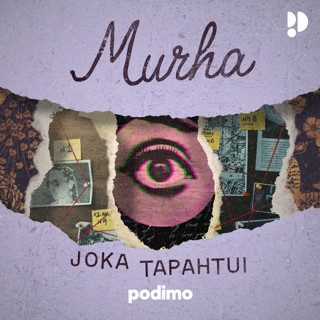
"This Has Been A Long Time Coming."
"I'm struggling. I’m not doing well." "I cry, it hurts my heart, sort of physically it hurts." "I want to scream." "Friends ask if I'm okay. And I tell them I'm not, because I'm not. How can we be okay when we live in a state of terror?" We asked you what you needed to say in this moment of reckoning with police brutality, structural racism, and grief. Here's what you told us. We want to keep talking with you. Send us a voice memo about what's on your mind right now, to deathsexmoney@wnyc.org.
5 Kesä 202021min

Financial Therapy: How Much Should I Help My Family?
Right now, Frenchie is feeling secure in her job as an administrator at a Texas college. But that's not the case for her dad and her three sisters. They're all experiencing various levels of financial fallout from COVID—and as she thinks back on past family crises and the ways she stepped in to help, Frenchie wonders if she'll find herself gravitating towards a familiar support role in this moment, and how sustainable that would be. "Because I also ask if something happens to me, is anybody going to be able to support me?" she tells Amanda. "And right now, I feel like the answer is no." This episode is part of a special Financial Therapy series here on Death, Sex & Money, hosted by Amanda Clayman. If you have a money anxiety weighing you down, send an email or a voice memo to financialtherapy@wnyc.org. Find the entire series at deathsexmoney.org/financialtherapy. We'd also love to know what you thought of this series. Give us your feedback at deathsexmoney.org/ftsurvey. And stay in touch with us! Sign up for our newsletter and we'll keep you up to date about what's happening behind the scenes at Death, Sex & Money. Plus, we'll send you audio recommendations, letters from our inbox and a note from Anna. Join the Death, Sex & Money community and subscribe today.
3 Kesä 202031min

What Do You Need To Say Right Now?
What do you need to say right now? As we take in the anguish that's surfacing today—about the fact that COVID19 is disproportionately impacting communities of color, about the violence of police brutality against Black people, and about all the different ways that white people are not stepping up to say those things are wrong—we want to hear from you. Record a voice memo with your thoughts and send it to us, at deathsexmoney@wnyc.org. And tune in to WNYC (or your local public radio station) tonight, June 1, at 8 pm ET, to listen to and participate in a two-hour live radio special in partnership with Minnesota Public Radio. It’s called America: Are We Ready: A National Call-In about Racism, Violence, and our Future Together.
1 Kesä 20200s

Financial Therapy: Why Did I Take That Risk?
Two years ago, Mathew* quit an executive job and struck out on his own to start an independent consulting firm. After months of bringing in "90% less than what [he] used to," business was finally starting to pick up earlier this year—and then the pandemic hit. With clients pulling contracts and invoices being paid late, Mathew is back to square one, wondering if the risks he took were worth it as his family deals with the consequences of his decision—and whether the need for emotional control that served him so well in his business career is still the right strategy for this crisis. *Name changed This episode is part of a special Financial Therapy series here on Death, Sex & Money, hosted by Amanda Clayman. If you have a money anxiety weighing you down, send an email or a voice memo to financialtherapy@wnyc.org. Find the entire series at deathsexmoney.org/financialtherapy. And stay in touch with us! Sign up for our newsletter and we'll keep you up to date about what's happening behind the scenes at Death, Sex & Money. Plus, we'll send you audio recommendations, letters from our inbox and a note from Anna. Join the Death, Sex & Money community and subscribe today.
27 Touko 202028min

Financial Therapy: What Is Our Savings For?
Before the pandemic, Dale ran an event space in Knoxville, Tennessee. After cancelling every booking this month—which was set to be their busiest ever—she finds herself wondering how to share the burden of her financial anxiety with her husband—and how to square the fact that after years of hustling to make her business a reality, she's really enjoying having some time alone. This episode is part of a special Financial Therapy series here on Death, Sex & Money, hosted by Amanda Clayman. If you have a money anxiety weighing you down, send an email or a voice memo to financialtherapy@wnyc.org. Find the entire series at deathsexmoney.org/financialtherapy. And stay in touch with us! Sign up for our newsletter and we'll keep you up to date about what's happening behind the scenes at Death, Sex & Money. Plus, we'll send you audio recommendations, letters from our inbox and a note from Anna. Join the Death, Sex & Money community and subscribe today.
20 Touko 202028min

Financial Therapy: Meet Amanda Clayman
Many of you are in financial transition right now. You've lost jobs, income, stable housing. And you're worried about what's to come. And this time of uncertainty isn't just bringing up thoughts about financial survival. It's also making us question our values, our identities...and whether the way we’ve done things in the past is still going to work. All of that can be difficult to process, especially as we're in isolation. So we're calling on an expert for help: financial therapist Amanda Clayman. For the next three weeks, Amanda's going to be talking with some of you about those issues that are surfacing around money in your lives—and helping you process them and figure out a path forward. "It's not a luxury to think about and to pay attention to the meaning of losing 80 to 90% of your income because for some of us, that's enough to send us into such a, an emotional tailspin that we aren't able to do...practical things," Amanda told me. "We, we are just stuck in feeling like, 'I'm a failure. This is never going to get any better.'" Listen to Financial Therapy with Amanda Clayman, starting on May 20 in the Death, Sex & Money podcast feed.
18 Touko 202014min

Madeleine Albright On Ambition and Obsoleteness
Madeleine Albright was in her early 20s when she wrote in an essay, "I am obsolete." She'd just become a mother to twins, and since graduating college had moved several times for her husband's jobs in journalism—a career field that she too had wanted to enter. "All of a sudden these things that I thought I was going to be able to do, I couldn't do," she told me. "Everything...was different than I had thought." It was her eventual divorce two decades later that Secretary Albright says put her on the path to becoming U.S. Ambassador to the United Nations, and Secretary of State under President Bill Clinton. Since leaving that position in 2001 in her mid-60s, she's stayed plenty busy—launching consulting and investment firms, and continuing to teach at Georgetown. But when I talked with her recently, she'd been self-isolating at home for weeks. "Because I'm in my eighties, and because of what's going on with the virus, all of a sudden I'm beginning to feel obsolete again," she told me. "I have been fighting gravity. That’s what I’ve been doing."
13 Touko 202033min

What Is A "Good Death" During A Pandemic?
We recently got an email from a listener named Lindsay. She's a nurse who normally works in pediatric oncology, but right now is working in an adult ICU with COVID-19 patients. And even though, as she wrote to us, she's "been surrounded by death" in her regular job, she says the way her current patients are dying from COVID-19 is far from what she would call a "good death." "You can't be in the room with them as they pass. You can't expose yourself that often," she wrote. "There is no time to know the people who slipped through your fingers—whose hair you washed, whose body you bathed, who you talk to during your shift to soothe yourself and them." She added, "It's simultaneously the most intimate and most anonymous relationship I've ever had." Lindsay ended her email to us with a question: "How do I as a nurse, or how do we as a healthcare community, give patients a good death during a pandemic?" Let us know if you have thoughts or answers for Lindsay. Our email address is deathsexmoney@wnyc.org.
8 Touko 20200s





















